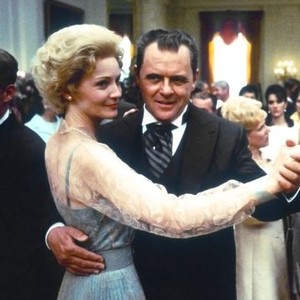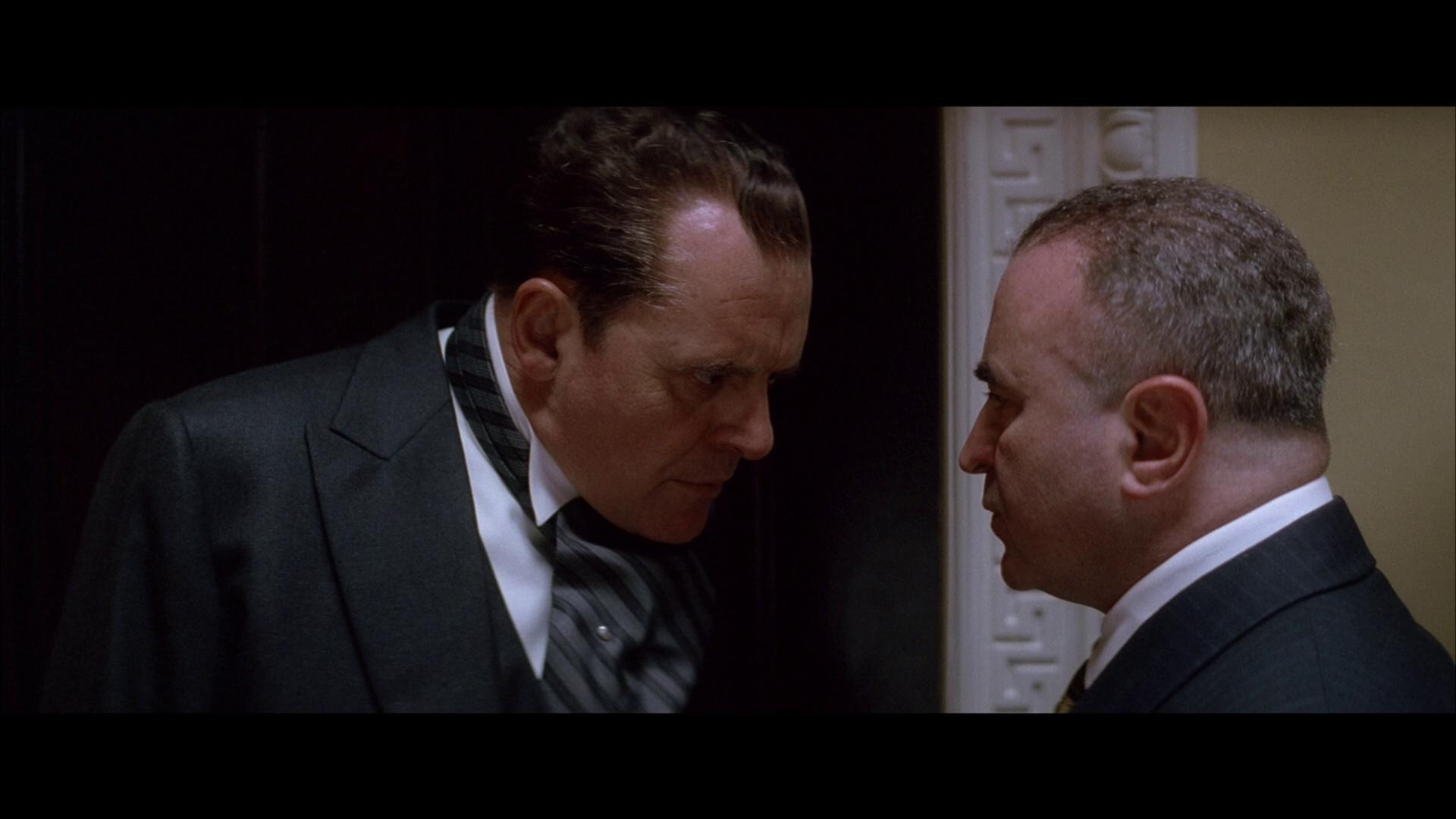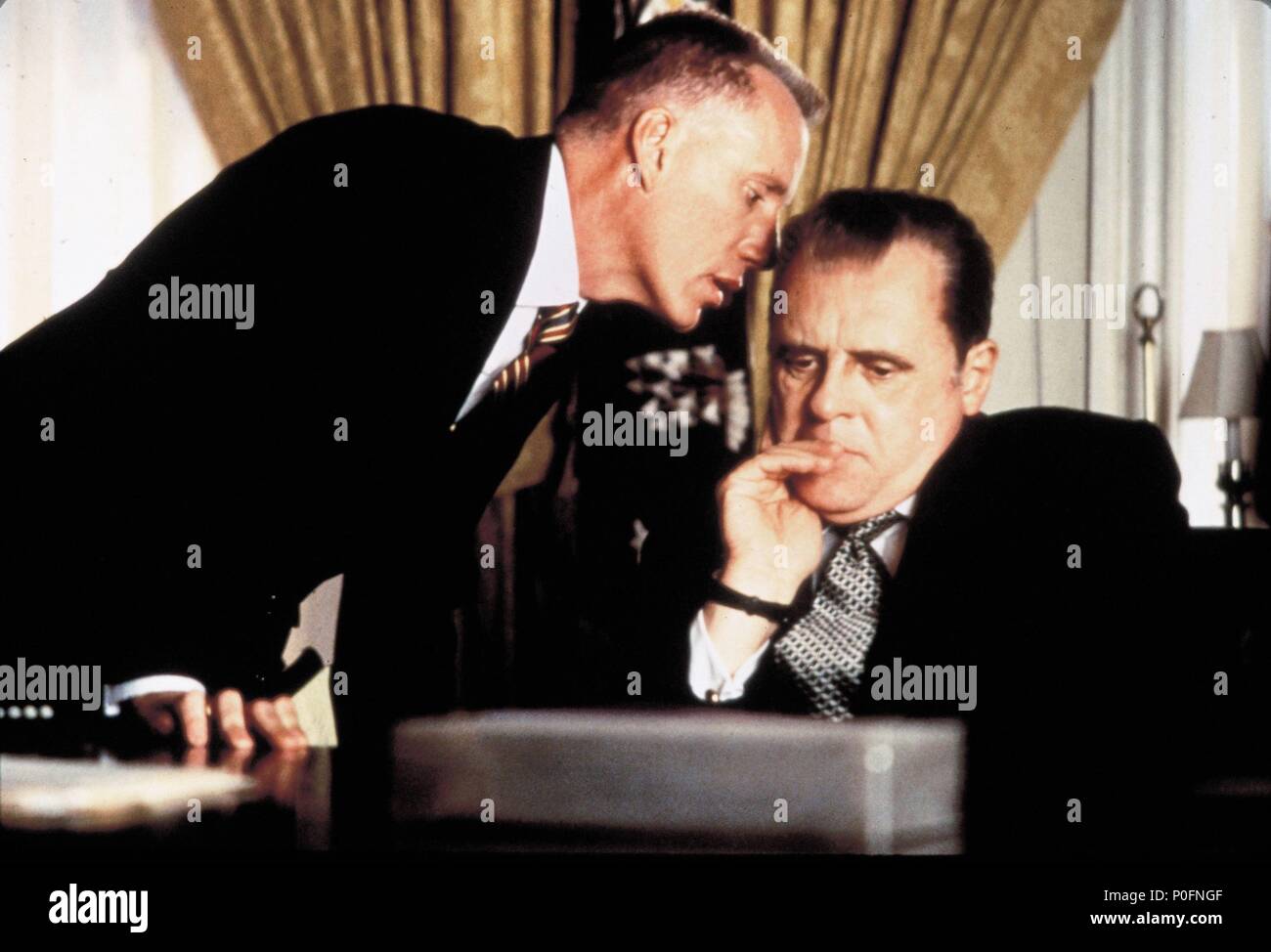← Back to Reviews
in
Nixon
Oliver Stone, who won three Oscars for writing and directing Born on the 4th of July and for directing Platoon, was equally impressive as the director and co-screenwriter of Nixon, an ambitious and technically breathtaking look at our 37th POTUS that pulls no punches in its approach to the subject. Stone did something here I've never seen before...he has mounted a biopic where the subject is the hero and the villain.

This look at the rise and eventually ugly downfall of Richard Nixon begins as the Watergate burglars are arrested and the sharks are beginning to circle the political waters regarding Nixon's involvement in what happened. The film then flashes back to Nixon's troublesome childhood, which included toxic relationships with his very religious mother and his often abusive father. The film then returns to the 1970's where we see Nixon in full self-preservation mode as he tries to hide his involvement in Watergate, tries to keep his marriage to Pat viable, and tries to legitimize to Americans his inability to get America out of Vietnam.

The Oscar-nominated screenplay by Stone, Stephen J Rivele, and Christopher Wilkensen does attempt to cover so much territory here, resulting in the film's severe overlength. The primary problem for this reviewer was that the screentime devoted to Nixon's childhood should have provided some connection to the kind of person that Nixon was, but it never really does that. We even get occasional flashes to the past that are supposed to legitimate some of the things the guy does, especially concerning his marriage to Pat. The portion of the story of Dick's marriage to Pat was one of the film's strongest elements, revealing a marriage that was much more troubled than I ever imagined.

What was the most fascinating aspect of the story was Stone's approach to presenting Nixon onscreen. It's not just a birth to death chronicle, but Stone takes a lot of dramatic license, and that's all it can be, in bringing the Nixon he believed in to the screen. It's like Stone took a real life historical figure and crafted a fictional composite of who Stone thought this guy was, which made this film absolutely fascinating whenever Nixon is onscreen. Stone makes no bones about the fact that he thinks Nixon did not put a lot of effort into getting us out of Vietnam and that the buck stopped at Nixon where Watergate was concerned. Stone's collaboration with his actor implies that a lot of time Nixon was not aware of the ramifications of his actions and felt accountable for none of it. Watch how Stone portrays Nixon throwing an entire White House administration under the bus, resulting in Henry Kissinger being the only staffer at his side when he realizes resignation is his only answer. Loved the answer provided by Howard Hunt when John Dean asks Hunt how he has the audacity to blackmail the President. It was the essence of Stone's Nixon in one line.

As he did a few years earlier with JFK, Stone, with a first rate assist from his film editing team, does a superb job of integrating his movie with archival footage, that really aided in taking us inside the important history being recreated here. Loved the footage of John Dean (David Hyde Pearce) being edited into the 1973 Watergate hearings.

Even with all the logistical nightmares involved here, Stone still manages to pull some powerhouse performances from a once in a lifetime cast. Sir Anthony Hopkins completely loses himself in the title role, a performance of power and pathos that, at times, almost evokes sympathy for the character, but doesn't and shouldn't that earned the actor his third Oscar nomination for Outstanding Lead Actor. Joan Allen's rich performance as Pat Nixon is easy to discount over Hopkins' thunder, but it is equally as effective earning her a Best Supporting Actress nomination. In addition to David Hyde Pearce as John Dean, there is also standout work from James Woods as HR Alderman, Powers Boothe as Alexander Haig, EG Marshall as John Mitchell, JT Walsh as John Ehrlichman, Ed Harris as Howard Hunt, Mary Steenburgen as Nixon's mother, and especially the late Paul Sorvino as Kissinger. And if you don't blink, you will be blown away by a brief and very effective appearance from the late Madeline Kahn as Martha Mitchell. Yes, it's longer than it needs to be, but Oliver Stone's delicate artistry makes it worth the time.
Oliver Stone, who won three Oscars for writing and directing Born on the 4th of July and for directing Platoon, was equally impressive as the director and co-screenwriter of Nixon, an ambitious and technically breathtaking look at our 37th POTUS that pulls no punches in its approach to the subject. Stone did something here I've never seen before...he has mounted a biopic where the subject is the hero and the villain.

This look at the rise and eventually ugly downfall of Richard Nixon begins as the Watergate burglars are arrested and the sharks are beginning to circle the political waters regarding Nixon's involvement in what happened. The film then flashes back to Nixon's troublesome childhood, which included toxic relationships with his very religious mother and his often abusive father. The film then returns to the 1970's where we see Nixon in full self-preservation mode as he tries to hide his involvement in Watergate, tries to keep his marriage to Pat viable, and tries to legitimize to Americans his inability to get America out of Vietnam.

The Oscar-nominated screenplay by Stone, Stephen J Rivele, and Christopher Wilkensen does attempt to cover so much territory here, resulting in the film's severe overlength. The primary problem for this reviewer was that the screentime devoted to Nixon's childhood should have provided some connection to the kind of person that Nixon was, but it never really does that. We even get occasional flashes to the past that are supposed to legitimate some of the things the guy does, especially concerning his marriage to Pat. The portion of the story of Dick's marriage to Pat was one of the film's strongest elements, revealing a marriage that was much more troubled than I ever imagined.

What was the most fascinating aspect of the story was Stone's approach to presenting Nixon onscreen. It's not just a birth to death chronicle, but Stone takes a lot of dramatic license, and that's all it can be, in bringing the Nixon he believed in to the screen. It's like Stone took a real life historical figure and crafted a fictional composite of who Stone thought this guy was, which made this film absolutely fascinating whenever Nixon is onscreen. Stone makes no bones about the fact that he thinks Nixon did not put a lot of effort into getting us out of Vietnam and that the buck stopped at Nixon where Watergate was concerned. Stone's collaboration with his actor implies that a lot of time Nixon was not aware of the ramifications of his actions and felt accountable for none of it. Watch how Stone portrays Nixon throwing an entire White House administration under the bus, resulting in Henry Kissinger being the only staffer at his side when he realizes resignation is his only answer. Loved the answer provided by Howard Hunt when John Dean asks Hunt how he has the audacity to blackmail the President. It was the essence of Stone's Nixon in one line.

As he did a few years earlier with JFK, Stone, with a first rate assist from his film editing team, does a superb job of integrating his movie with archival footage, that really aided in taking us inside the important history being recreated here. Loved the footage of John Dean (David Hyde Pearce) being edited into the 1973 Watergate hearings.

Even with all the logistical nightmares involved here, Stone still manages to pull some powerhouse performances from a once in a lifetime cast. Sir Anthony Hopkins completely loses himself in the title role, a performance of power and pathos that, at times, almost evokes sympathy for the character, but doesn't and shouldn't that earned the actor his third Oscar nomination for Outstanding Lead Actor. Joan Allen's rich performance as Pat Nixon is easy to discount over Hopkins' thunder, but it is equally as effective earning her a Best Supporting Actress nomination. In addition to David Hyde Pearce as John Dean, there is also standout work from James Woods as HR Alderman, Powers Boothe as Alexander Haig, EG Marshall as John Mitchell, JT Walsh as John Ehrlichman, Ed Harris as Howard Hunt, Mary Steenburgen as Nixon's mother, and especially the late Paul Sorvino as Kissinger. And if you don't blink, you will be blown away by a brief and very effective appearance from the late Madeline Kahn as Martha Mitchell. Yes, it's longer than it needs to be, but Oliver Stone's delicate artistry makes it worth the time.
